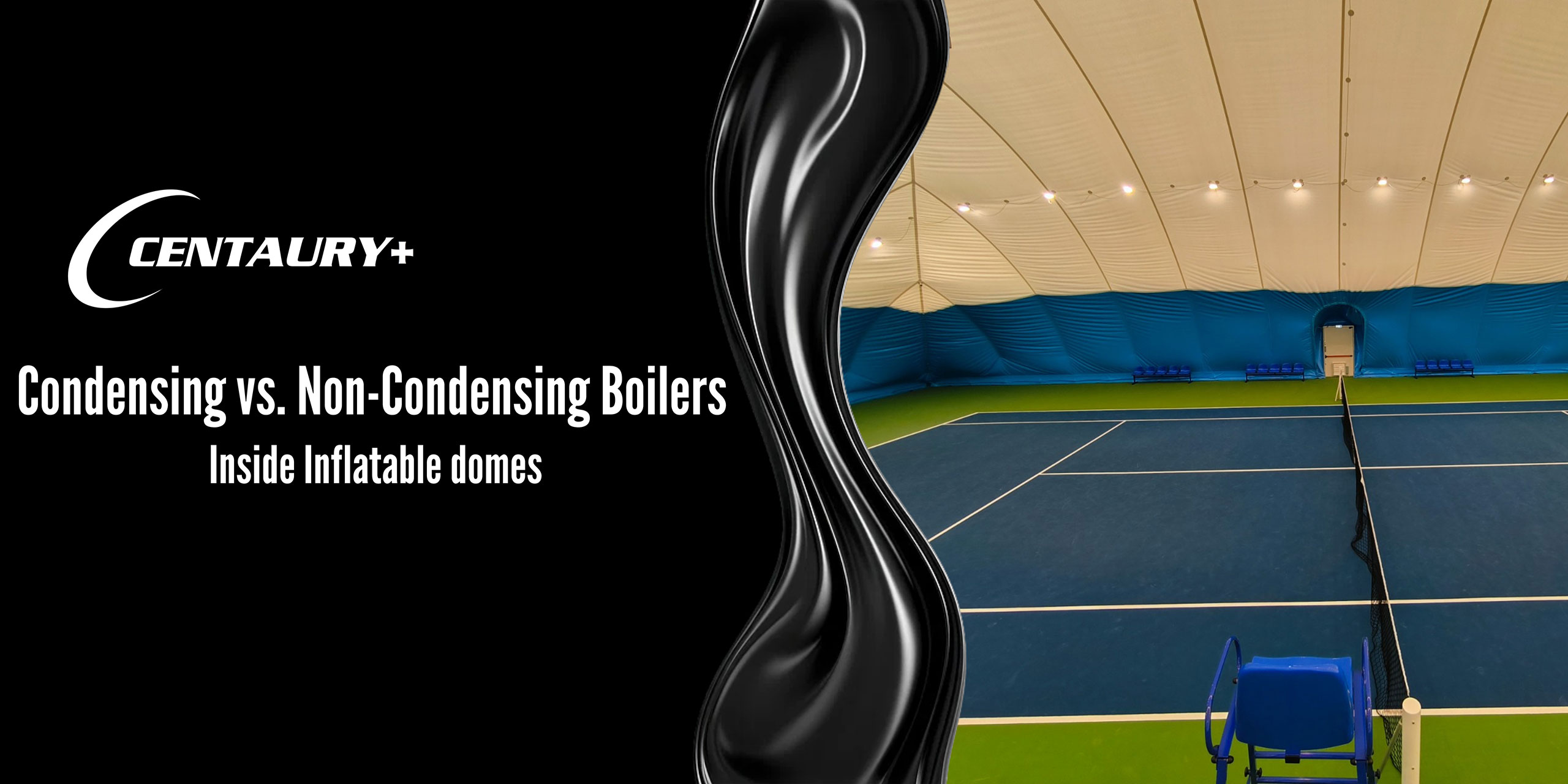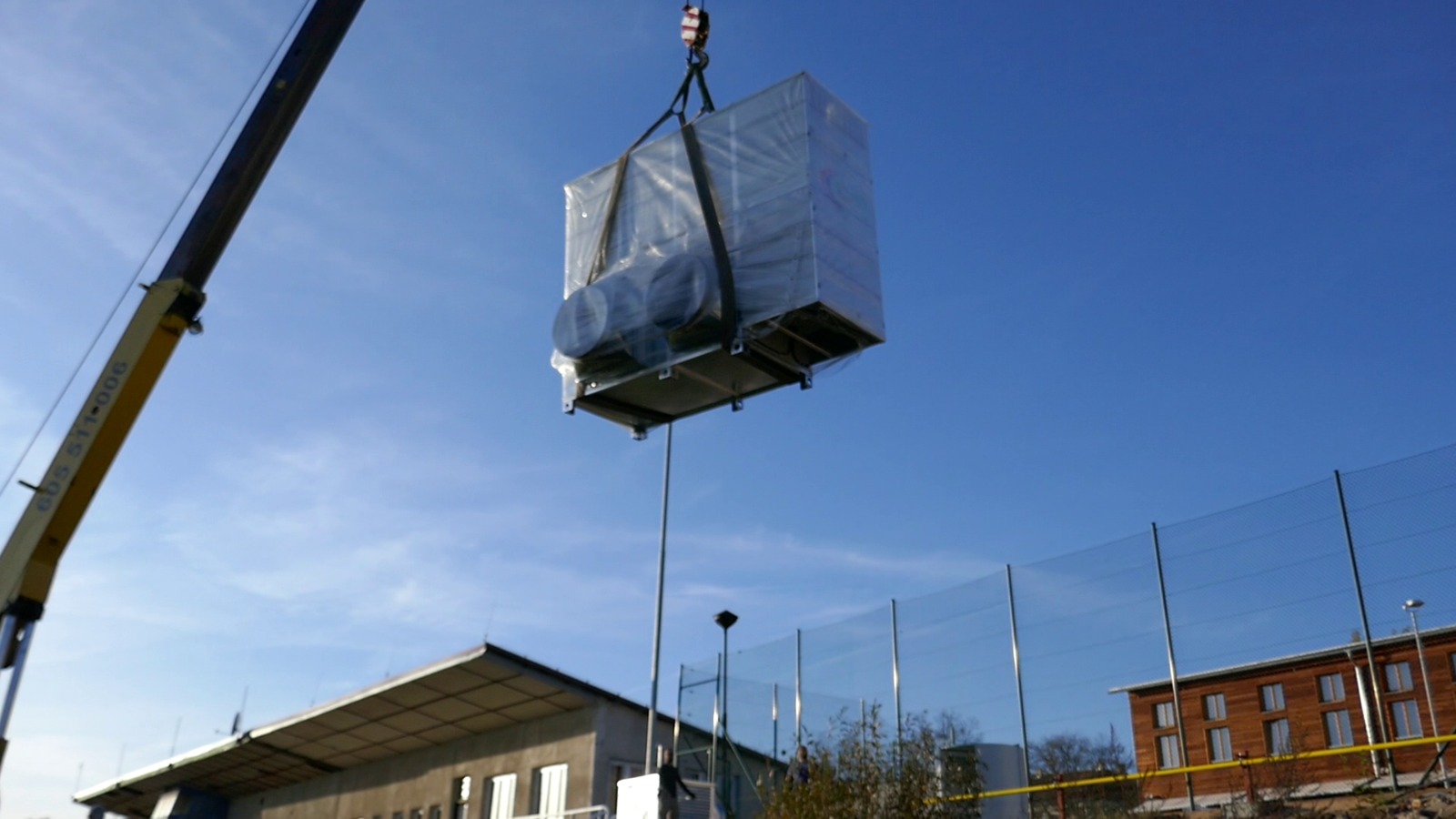
Condensing vs. Non-Condensing Boilers for Inflatable Domes: Making the Right Choice
Are you considering heating options for your inflatable halls or air domes? You've come to the right place! Today, we're diving into the world of boilers and exploring how they can keep your temporary sports structures warm and cozy. Let's compare condensing and non-condensing boilers to help you make an informed decision for your inflatable structure.

Understanding Boilers in Inflatable Structures
Before we dive into the specifics, let's quickly review why boilers are essential for inflatable domes:
- Temperature control
- Comfort for users
- Protection of the structure
Now, let's explore the two main types of boilers you might consider for your air dome.
What Are Condensing Boilers?
Condensing boilers are the new kids on the block in the heating world. They're known for their high efficiency and eco-friendly operation. But how do they work?
Condensing boilers capture and use heat from exhaust gases that would otherwise be wasted in traditional boilers.
Pros of Condensing Boilers for Inflatable Halls
- High efficiency: They can achieve efficiency ratings over 90%
- Lower fuel costs: Less gas used means lower bills
- Fuel-efficient option: Optimized energy use for inflatable hall climate control
Cons of Condensing Boilers for Air Domes
- Higher upfront cost
- Need for condensate drainage system
- More complex installation
What Are Non-Condensing Boilers?
Non-condensing boilers are the traditional choice for heating. They've been around for a long time and are still widely used in many temporary sports structures.
Pros of Non-Condensing Boilers for Inflatable Structures
- Lower initial cost: Easier on the wallet upfront
- Simpler installation: Less complicated to set up
- Familiar technology: Many technicians know how to work with them
Cons of Non-Condensing Boilers for Inflatable Domes
- Lower efficiency compared to condensing boilers
- Higher fuel costs over time
- More heat wasted in the exhaust
Comparing Efficiency: Condensing vs. Non-Condensing
Let's break down the efficiency difference:
- Condensing boilers: Can achieve efficiency ratings over 90%
- Non-condensing boilers: Typically have efficiency ratings of 80-85%
This difference might seem small, but it can add up to significant savings over time, especially for large inflatable halls.
Installation Considerations for Air Domes
When it comes to installing boilers in air domes, there are a few key points to consider:
- Space requirements: Condensing boilers might need more room for the condensate system
- Ventilation: Both types need proper ventilation, but condensing boilers have specific requirements
- Drainage: Condensing boilers need a way to dispose of the condensate
Cost Analysis: Short-Term vs. Long-Term
Let's look at the financial aspects of choosing between condensing and non-condensing boilers for your inflatable dome:
Short-Term Costs
- Non-condensing boilers are generally cheaper to buy and install
- Condensing boilers have a higher upfront cost
Long-Term Costs
- Condensing boilers can lead to significant savings on fuel bills
- Non-condensing boilers might cost more to operate over time
The long-term savings of a condensing boiler could offset the higher initial investment, especially in larger inflatable halls with high heating demands.
Maintenance Requirements
Both types of boilers need regular maintenance, but there are some differences:
Condensing boilers:
- Need annual servicing
- Require checks on the condensate system
- May need specialized technicians
Non-condensing boilers:
- Also need annual servicing
- Simpler system means potentially easier maintenance
- More technicians are familiar with these systems
Making the Right Choice for Your Inflatable Hall
So, how do you decide which boiler is right for your air dome? Consider these factors:
- Size of your structure: Larger inflatable halls might benefit more from condensing boilers' efficiency
- Climate: Colder regions might see more benefit from condensing boilers
- Budget: Both short-term and long-term financial considerations
- Environmental goals: If reducing emissions is a priority, lean towards condensing
- Available infrastructure: Consider if you have the necessary setup for a condensate system
Real-World Application in Inflatable Structures
Let's look at how these boilers perform in real inflatable dome:
- Sports halls: Condensing boilers can handle the high heating demands efficiently
- Exhibition spaces: Non-condensing might be sufficient for temporary setups
- Year-round facilities: Condensing boilers could provide significant long-term savings
The Future of Heating in Air Domes
As technology advances, we're seeing exciting developments in heating systems for inflatable structures:
- Smart controls: Both boiler types can benefit from advanced control systems
- Hybrid systems: Combining boilers with renewable energy sources
- Improved efficiency: Even non-condensing boilers are becoming more efficient
Conclusion: Making an Informed Decision
Choosing between condensing and non-condensing boilers for your inflatable hall isn't a one-size-fits-all decision. It depends on your specific needs, budget, and long-term goals. Here's a quick recap:
- Condensing boilers: Higher efficiency, lower running costs, better for the environment
- Non-condensing boilers: Lower upfront cost, simpler installation, familiar technology
Remember, the best choice is the one that meets your unique requirements for your air dome or temporary sports structure.
We hope this guide helps you make an informed decision about heating your inflatable structure. If you have more questions about air domes or inflatable halls, don't hesitate to contact us. We're here to help you create the perfect environment for your needs!
